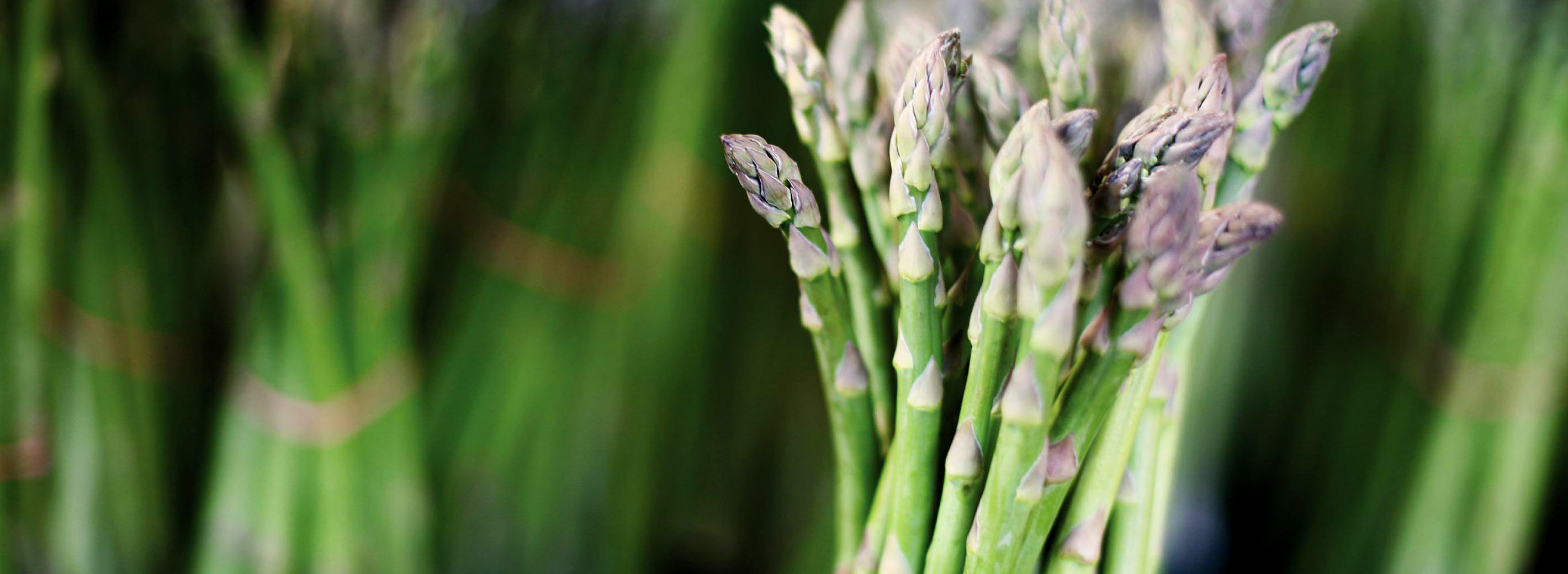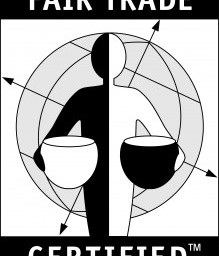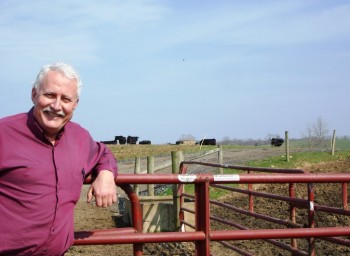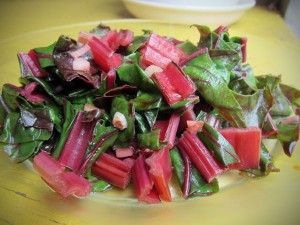Student Life, Washington University at Saint Louis’s campus newspaper, recently profiled Angela Ford, a Bon Appétit cashier at the Bear’s Den because of her positive attitude and ability to brighten every customer’s day.

Blog: Featured
+ Blog Categories
Celebrating Food Week at the University of Pennsylvania
- Blog
The University of Pennsylvania is now in the midst of its third annual Food Week, sponsored by Bon Appétit at Penn Dining. This annual celebration covers a variety of topics — from local food, to food justice, to nutrition — and is a collaborative effort among students, faculty, local community activists and farmers, and Fox Leadership at Penn. Here are some highlights of last year’s Food Week, including a Food Justice Banquet in the form of a four-course meal (catered by Bon Appétit of course) and a panel on agriculture featuring several of our Farm to Fork partners:

Recipe: Bon Appétit at Nordstrom’s All-Local Scallops, Chard, and Farro
- Blog
The Eat Local Challenge has become one of my favorite celebrations each year. While many of our usual holidays come with prescribed dishes, such as turkey and stuffing for Thanksgiving, brisket and matzoh ball soup for Passover, and cookies topped with red and green sprinkles for Christmas, the Eat Local Challenge menu is always different — year to year, chef to chef, and region by region. The challenge is to create an whole menu where every ingredient (except for salt) comes from within 150 miles. While this is no easy task, I also find the challenge to be encouraging. Whether a chef or an eater, it encourages everyone to explore unusual flavors – found on our local farm and range lands and in our forests, lakes, and oceans, to learn about new producers, and tap into our inner creative spirit.
Employee Spotlight: Arthur Curtis, Making Wash U Folks Smile Every Day
- Blog
This video is the first in a series highlighting Bon Appétit employees across the country and the wonderful work they do. Here we are proud to introduce a man who brings a smile to countless faces every day—Arthur Curtis, line server at Bon Appétit at Washington University in St. Louis.

“Ethically Delicious” Uniforms in time for Fair Trade Month
- Blog
Conscientious consumers rely on third-party-certified labeling programs such as organic, which reassures us that those products were grown without toxic pesticides or using genetically engineered seeds, and Certified Humane, which tells us that the animals we’re eating were raised ethically. But neither of those labels tells us anything about how the people behind the products were treated. That’s why the Fair Trade Certified™ label is so important. October is Fair Trade month, and we at Bon Appétit Management Company are proud to have partnered with Fair Trade USA to help raise awareness.
Young Farmworkers Share Their Stories in New Film
- Blog
For most industries, state law in North Carolina mandates that children must be at least 14 years old to work. But like the rest of the country, there is no age requirement for agricultural work and many start at 10 or 12, and get exposed to toxic pesticides during formative years. Toxic Free NC is a non-profit organization that works to “put people before pesticides” and advocates for alternatives that protect the health and environment of those in the surrounding community. In 2008, they started the Farm Worker Documentary Project, documenting the experiences of workers in fields and labor camps across North Carolina. Their most recent project is called Overworked & Under Spray: Young Farm Workers’ Pesticide Stories. Six young farm workers talk about their pesticide exposure in the fields and the resulting health effects. The film also includes advocacy […]

Gallaudet University Goes All Out For Eat Local Challenge 2011
- Blog
To any Gallaudet University students walking into the Bon Appétit café on Tuesday Sept. 27, it seemed like a transformation had occurred. The normally wood-colored tables were decked out in blue and red checkered picnic-style cloth, and the entire café staff had donned blue jeans and farmers hats. It was Eat Local Challenge Day, and the point was to celebrate local, farm-fresh food. Students scattered themselves at different stations throughout the café in honor of the event. One group hosted a Taste Test, challenging their peers to guess which tomato was local (picked fresh that day from the Gallaudet Community Garden) and which was conventional (from California). Green Gallaudet, the on-campus environmental group, spoke with passers-by about the impacts our food choices have on the environment (did you know that by eating one less hamburger a week, you can significantly […]

Baked Apple and Sweet Potato Latkes
- Blog
By Kristen Rasmussen, MS, RD For this month’s well being challenge, we encourage you to get to know your food – and where it comes from – by making meals with seasonalingredients from local producers. Demonstrate your commitment to the local food community by posting pictures or comments about your local and seasonal food experiences on our Facebook page wall. Here’s a recipe to get you started. Baked Apple & Sweet Potato Latkes Makes about twelve 2 – 3 inch latkes

Grain-fed vs. grass-fed beef — and somewhere in between?
- Blog
Thanks to Michael Pollan‘s book The Omnivore’s Dilemma and the documentary Food, Inc., more people have become aware that the majority of cows in this country are raised on a grain-based diet for the last few months of their lives — and why that’s problematic for the health of the cows, the health of the humans who eat them, and the environment. The short version: Grains such as corn and soy are cheap carbohydrates that make cows get fat fast (not unlike humans). But cows’ digestive systems were designed to handle a high-fiber diet of mostly fresh grass or hay, with some natural grains. High-grain corn and soy diets — and the feedlots in which they are stuffed with them — cause many cattle to get sick, and encourage the prevalence of antibiotic-resistant E. coli as well. But as with […]

Get Closer to Your Food: Simple Sautéed Garlic Chard (or other greens)
- Blog
By Kristen Rasmussen, MS, RD For this month’s Well Being Challenge, we’re encouraging you to Get Closer to Your Food by making meals with seasonal ingredients from local producers. We’d love for you to show your commitment to the local food community by sharing your food pictures or comments about your local and seasonal food experiences on our Facebook page wall. Here’s a quick, tasty recipe to get you started. Simple Sautéed Garlic Chard (or other greens) Serves 6-8
